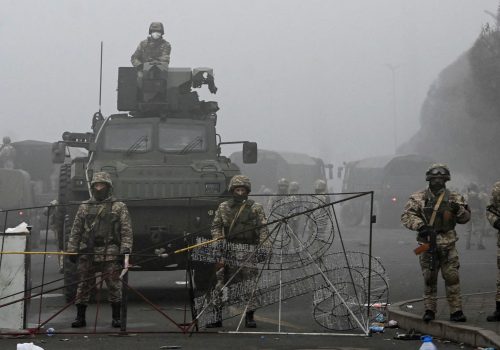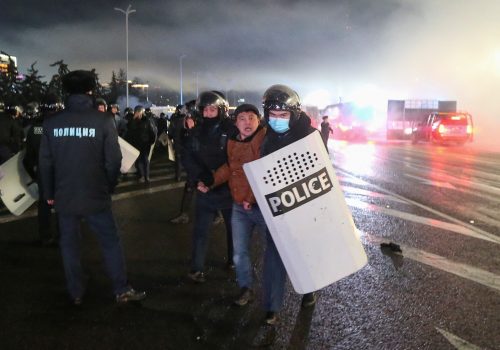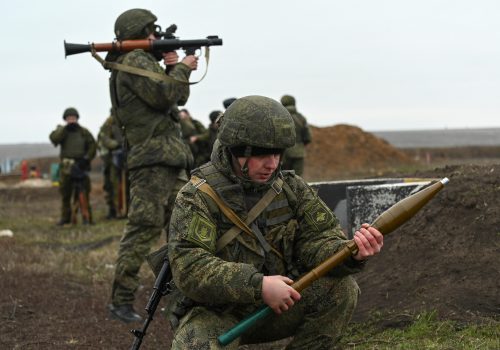FAST THINKING: Is Kazakhstan’s crisis the Kremlin’s next opportunity?
GET UP TO SPEED
What began earlier this week as protests against a fuel-price hike in Kazakhstan spiraled out of control over the past 24 hours, resulting in violent clashes between police and protesters that have reportedly left dozens dead. To deal with the crisis, Kazakh President Kassym-Jomart Tokayev has invited peacekeepers from the Collective Security Treaty Organization (CSTO), a Russian-led military alliance, into his country. With those troops now on the ground, our experts explain what this moment means for the authoritarian, energy-rich Central Asian nation—and why Russia is watching with equal parts interest and unease.
TODAY’S EXPERT REACTION COURTESY OF
- Melinda Haring (@melindaharing): Deputy director of the Eurasia Center
- Emma Ashford (@EmmaAAshford): Senior fellow with the Scowcroft Center’s New American Engagement Initiative
- John Herbst (@JohnEdHerbst): Senior director of the Eurasia Center and former US ambassador to Ukraine and Uzbekistan
Shattered stability
- Melinda tells us this level of unrest is “very unusual” for Kazakhstan, which has been a mostly stable autocracy—with rigged elections and no free expression—since the collapse of the Soviet Union in 1991. “The scale of these protests is unprecedented. A spike in fuel prices catalyzed the protests, but the causes are far deeper and the protests are globally significant,” she says.
- Both Beijing and Moscow are watching closely, thanks to the extensive borders they share with Kazakhstan and their vested interests in the country. Russia bases its Baikonur Cosmodrome spaceport there. And both Russia and China need Kazakhstan’s natural gas, Emma says: “If these protests become significant enough to disrupt energy production or transit, they could have knock-on economic effects disproportionate to Kazakhstan’s political importance.”
- John believes the crisis poses a particular challenge for Russian President Vladimir Putin, who’s bent on restoring Kremlin influence across the former Soviet Union. And Kazakhstan, with a significant ethnic Russian population (and substantial energy resources) concentrated in the north near the Russian border, is squarely in Putin’s sights. “In some places—Crimea [in Ukraine] and perhaps northern Kazakhstan—that means Moscow seizing and annexing territory. In other places, it means ensuring national-security and economic policies consistent with Kremlin interests,” he says.
Subscribe to Fast Thinking email alerts
Sign up to receive rapid insight in your inbox from Atlantic Council experts on global events as they unfold.

You and what army?
- John says the decision for the CSTO to deploy to Kazakhstan was likely made by Putin—and it’s notable that this group took precedence over the Shanghai Cooperation Organization (SCO), which includes both Russia and China. “This means that Putin considered it more important to strengthen Moscow’s position in Kazakhstan than to accommodate China,” he says. “It’s a message to Beijing that there are limits to Moscow’s acceptance of junior-partner status” in their budding bilateral relationship.
- The CSTO deployment could also leave Tokayev beholden to Putin. “Right now, the situation is moving in a direction where Moscow will have a weak guy in charge who owes them big time,” Melinda says.
- But what if the CSTO fails to restore order? “Moscow’s position in Central Asia would deteriorate if a popular revolt produces a reform-minded government, or if Tokayev calls on China and the SCO for help to stay in power,” John adds.
- With around 100,000 Russian troops still parked along the Ukrainian border, the question is whether the Russian leader can exploit both situations. “At the moment, Putin is trying to have his cake and eat it too,” John tells us, but “it may prove difficult for the arch opportunist to successfully attend to both at the same time.”
A watchful West
- Despite the worrying scenes in Almaty, Kazakhstan’s largest city and the primary site of the violence, Emma recommends that the United States remain hands-off. “Given the Russian sensitivity to the perception that the United States supports so-called color revolutions in the region, support for the Kazakh protesters is liable to increase tensions with Moscow,” she argues.
- Melinda disagrees—arguing that Washington would be wise to press the Kazakh leadership to cease the violence and stop blacking out the internet: “The United States must press the Kazakhs to hold legitimately free and fair elections or else they will see more and more protest activity.”
Further reading
Thu, Jan 6, 2022
How Kazakhstan could shift Putin’s calculus on Ukraine
New Atlanticist By John E. Herbst
The unrest poses a question for Putin: Should he continue his intimidation campaign on his western flank or address the dangers to his south?
Wed, Jan 5, 2022
Kazakhstan is in chaos. Here’s why the West should be watching.
New Atlanticist By
Atlantic Council experts break down what's at stake for Russia, energy supplies, and the future of the strategically located Central Asian nation.
Thu, Dec 30, 2021
How to deal with the Kremlin-created crisis in Europe
UkraineAlert By
The Kremlin appears to be setting the stage for a major conventional assault on Ukraine. Twenty-five distinguished experts and former senior officials urge the Biden administration to take decisive action.
Image: A view shows a burning police car during a protest against LPG cost rise following the Kazakh authorities' decision to lift price caps on liquefied petroleum gas in Almaty, Kazakhstan on January 5, 2022. Photo via REUTERS/Pavel Mikheyev.


